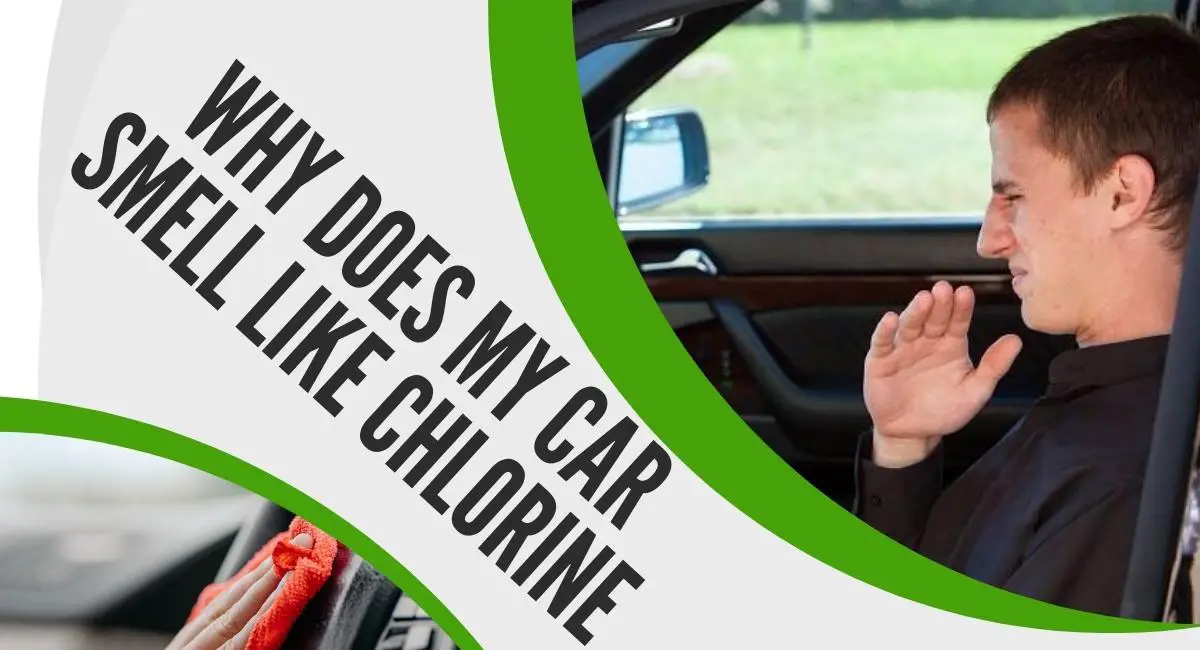Have you ever stepped into your car only to be greeted by a pungent odor reminiscent of a swimming pool? The distinctive, strong, and piercing smell is chlorine. You may wonder what could be causing this unpleasant scent and how to eliminate it.
A strong chlorine odor in your car can be due to various factors, such as dirty AC systems, car maintenance chemicals, interior water leaks, battery defects, or fuel leaks. However, effective methods are available to eliminate this unpleasant smell, so there’s no need to worry.
If you are wondering why your car smells like chlorine and how to eliminate the odor, you are in the right place. This article will explore the reasons behind the chlorine smell in your car and provide effective methods to eliminate it.

Why Does My Car Smell Like Chlorine
A chlorine-like smell in your car can be attributed to various factors, as explained below:
Spillage of Swimming Pool Products
These could be the culprits if you’ve recently transported swimming pool cleaning products or chemicals. These products often contain high amounts of chlorine, and any spillage or residue could cause a persistent chlorine-like smell in your car.
Use of Certain Cleaning Products
Some car cleaning products have chlorine-based components, which could impart this distinctive smell. If the smell appeared after a cleaning session, this might be your answer. Certain car cleaning products have the potential to contain chlorine, including:
Glass cleaners: These cleaners remove dirt and grime from car windows. However, some glass cleaners may contain ammonia and chlorine, resulting in a chlorine smell lingering in the car.
Upholstery cleaners: These cleaners remove stains and dirt from car seats and carpets. Unfortunately, some upholstery cleaners may contain chlorine bleach, which can contribute to a strong chlorine odor in the car.
All-purpose cleaners: As the name suggests, these cleaners’ design allows them to clean various surfaces in the car, such as the dashboard, door panels, and center consoles. It is important to note that some all-purpose cleaners may contain chlorine, leading to the persistence of a chlorine smell in the car.
Car Coolant Leakage
A car’s coolant can sometimes emit an odor similar to chlorine when it leaks and heats up on the engine. While it’s a sweet, syrupy smell, some car owners may interpret it as a chlorine-like scent.
Presence of Mold and Mildew in the Air Conditioning System
When mold and mildew grow in your car’s air conditioning system, they can produce a potent, chlorine-like odor. It is more likely that the smell intensifies when you turn on the AC. Several factors can contribute to mold growth in a car, including:
- Water leaks: If there are any water leaks in the car, it creates a damp environment ideal for mold and mildew growth. These leaks can be from windows, doors, sunroofs, or windshields.
- Wet items left in the car: Leaving wet things in the car, such as clothing, towels, or other damp materials, can provide a moisture-rich environment that encourages mold growth. It is important to remove and dry these items promptly.
- Humidity: High humidity levels can create excess moisture inside the car, promoting the growth of mold and contributing to the chlorine-like odor. It is prevalent in areas with humid climates.
- Poor hygiene: Neglecting proper car hygiene can make it easier for mold and mildew to take hold. Failing to clean spills, properly dry the car’s interior, or regularly maintain cleanliness can create an environment conducive to mold growth.
Battery Overheating
In addition to leakage, if a car battery overheats, it can emit a chlorine-like odor. The heat causes chemical reactions within the battery, resulting in the unexpected smell of chlorine.
To prevent the car battery from overheating, consider the following steps:
Park in shaded areas: Whenever possible, park your car in a shady location, such as a garage or under a tree. Direct sunlight can increase the temperature inside the vehicle and contribute to battery overheating.
Follow charging instructions: When charging the battery, follow the manufacturer’s instructions to avoid overcharging. Overcharging can generate excessive heat and lead to battery overheating. Use a proper charger and monitor the charging process closely.
Regularly check the battery: Maintain battery health by inspecting it for any signs of damage, leakage, or excessive heat. If you notice any abnormalities, it may be necessary to replace the battery to prevent further overheating issues.
Keep the battery clean: Regularly clean the battery terminals and cables to prevent corrosion. Corrosion can hinder proper electrical conductivity, leading to increased resistance and subsequent overheating of the battery. Use a mixture of baking soda and water to clean the terminals, and ensure they are securely connected.
Exposure to Environments with High Chlorine Content
Lastly, your car might pick up the scent if you park or drive through areas with high chlorine content in the air (near a public pool or chemical plant).
Potential Health Risks Associated with Chlorine Smell
Recognizing the potential health implications of chlorine smell in cars is important. In the short term, high chlorine concentrations can irritate the eyes, throat, and lungs. Long-term exposure may cause chronic health issues, such as bronchitis and other respiratory problems.
How to Get Rid of Chlorine Smell in Car
Identifying the chlorine smell starts with a simple sniff test. Identify the specific smell and observe when it occurs. Does it worsen when the car is hot or air conditioning? Check for spilled substances, inspect the AC system for mold, look for signs of coolant leakage, and review your car’s interior materials.
Once you’ve determined the cause of the chlorine smell, you can take measures to eliminate it.
Cleaning Techniques
Specialized cleaning products designed to remove chlorine smell in cars are available. Thoroughly clean the car’s interior, paying extra attention to areas where spills may have occurred, and remove any residual cleaning products that contain chlorine from the car.
Clean all surfaces, including the dashboard, seats, carpets, and floor mats, with a mild detergent or upholstery cleaner.
Ventilation
Open all windows and doors to allow fresh air to circulate inside the car. Use fans or air circulation devices to facilitate air movement. Then leave the car open for some time to help dissipate the chlorine smell.
Addressing Underlying Issues
If the coolant system leaks, a repair is crucial for the smell issue and your car’s performance. Professional cleaning of the AC system might be necessary for mold and mildew. Should materials inside the car be causing the smell, consider replacing them.
Effective DIY Approaches to Eliminate the Chlorine Smell in Your Car
When faced with a chlorine smell in a car, you can try several DIY methods to eliminate the odor. Here are some effective approaches:
Activated Charcoal
Place activated charcoal briquettes or odor-absorbing bags inside the car.
Activated charcoal has excellent absorption properties and can help neutralize odors, including the chlorine smell.
Leave the charcoal in the car for a few days to absorb the odor.
Baking Soda
Sprinkle baking soda generously on the upholstery, carpets, and mats. Leave the baking soda on overnight or overnight to soak up the odor. And vacuum the baking soda thoroughly to remove it, along with the trapped smell.
Vinegar Solution
Create a solution of equal parts white vinegar and water. Dampen a cloth or sponge with the vinegar solution and wipe down all interior surfaces of the car. Vinegar is known for its deodorizing properties and can help eliminate the chlorine smell.
Coffee Grounds
Place coffee grounds in a bowl or open container and leave it inside the car.
Coffee grounds have a natural ability to absorb odors and help neutralize the chlorine smell.
Keep the coffee grounds inside the car for a few days before removing them.
Prevention Strategies
It’s vital to maintain good car hygiene to avoid future problems. Regular cleaning and airing out the car can prevent odors from building up. Below are effective strategies you to use.
- Avoid storing chlorine-related products in your car. If you need to transport such products, ensure they are properly sealed and secured to prevent leaks or spills.
- Regularly clean and maintain your car’s interior. It includes vacuuming the carpets, wiping down surfaces, and cleaning upholstery. Regular maintenance will help prevent the buildup of odors.
- Consider using odor absorbers or air fresheners specifically designed for cars. Opt for natural, non-toxic options to minimize chemical exposure.
- Be cautious of your surroundings. If you frequently park near swimming pools, water treatment facilities, or areas where chlorine is used, be mindful of potential sources of contamination.
- Regularly check for leaks in your car. Inspect areas such as the engine, fuel lines, and radiator for any signs of leaks or spills. Address any issues promptly to prevent chemical odors from developing.
Conclusion
Experiencing a chlorine-like smell in your car can be perplexing and concerning. There are various causes for this odor, ranging from the spillage of swimming pool products to mold in the air conditioning system. It’s vital to investigate the source of this smell, as not only is it unpleasant, but it could also indicate an underlying issue with the vehicle or pose health risks.
Important Read: Why is My Radiator Fan Shaking, and How Can I Fix It?
In summary, taking a proactive approach to investigate, address, and prevent the chlorine smell in your car is essential for your health and comfort. By keeping your vehicle well-maintained and clean, you can enjoy a more pleasant driving experience free from the pungent odor of chlorine.
